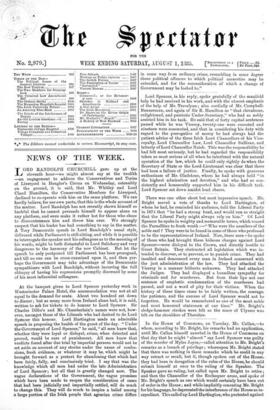There was one other short but most impressive speech. Mr.
Bright moved a vote of thanks to Lord Hartington, of whom he had, he reminded his audience, told the Liberal Party in 1874 that "he had a strong head, and would run so straight that the Liberal Party might always rely on him." Of Lord Spencer he spoke in weighty and memorable terms, which roused the Parnellites to fresh wrath :—" Who were the assailers of the noble earl ? They were to be found in some of those who professed to be the representatives of Ireland. Now, these men—he spoke of those who had brought these hideous charges against Lord Spencer—were disloyal to the Crown, and directly hostile to Great Britain. They obstructed all legislation which was in- tended to discover, or to prevent, or to punish crime. They had insulted and denounced every man in Ireland concerned with the just administration of the law. They had attacked the Viceroy in a manner hitherto unknown. They had attacked the Judges. They had displayed a boundless sympathy for criminals and for murderers. But from their lips not one sentence of emphatic condemnation of the murderers had passed, and not a word of pity for their victims. When the history of these times came to be fairly written, the courage, the patience, and the success of Lord Spencer would not be forgotten. He would be remembered as one of the most noble and most honoured statesmen of our time." Mr. Bright's sledge-hammer strokes were felt as the mace of Ulysses was felt on the shoulders of Thersites.


































